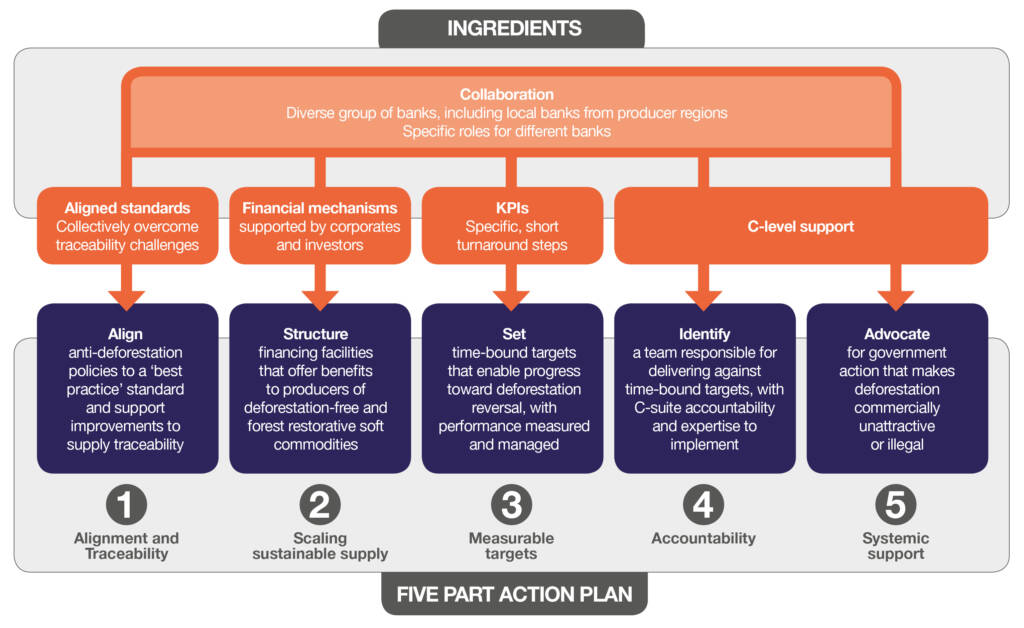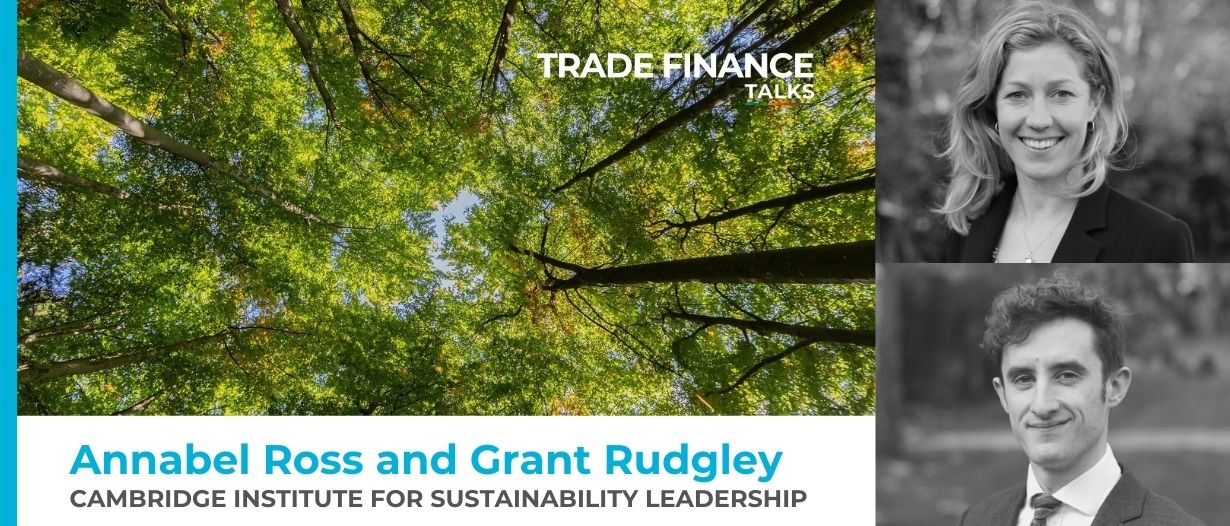Despite longstanding and widespread awareness of alarming rates of deforestation, there remains considerable debate as to who should do what, where, when, and how. The debate is understandable – the challenge of halting and reversing deforestation is not simple. Amongst other things, it requires an alignment of political, business, and financial agendas, alongside enhanced traceability, supply chain digitisation, and experts with local knowledge of the landscapes and communities affected.
While the debate is understandable, inaction is not – the consequences are severe and systemic. There is an urgency and importance to making progress with meaningful impact. Trade finance, being the lifeblood of most cross-border transactions, has a powerful part to contribute to halting and reversing deforestation. The benefits are considerable – contributing to decarbonisation targets, protecting and restoring nature, and building more inclusive and resilient societies.

Who should do what?
Supply chain complexity means that a system change is required to tackle embedded deforestation, and for system change a wide range of stakeholders are needed. Leadership and deliberate action is required at all levels: in policy, business, and finance at the macro, organisational, and transaction level. This means that any action must be collaborative, with stakeholders along the value chain contributing their unique expertise.
“Any action must be collaborative, with stakeholders along the value chain contributing their unique expertise.”
The University of Cambridge Institute for Sustainability Leadership (CISL), through the Banking Environment Initiative (BEI), has led a programme to better map and understand deforestation risk and financial links along supply chains. This has complemented other initiatives focused on the role of policy and business.
The unique role banks can play in combating deforestation – both in terms of allocating capital for a forest restorative future and enhancing due diligence along supply chains – requires the support of business, experts, and investors. What is more, to make meaningful progress, banks from along the supply chain need to act together. Local and global banks together can play a valuable intermediary role, connecting capital with businesses on-the-ground to incentivise compliance with anti-deforestation standards. Banks, and trade finance in particular, can seek to:
- Support traceability efforts, in partnership with data providers
- Raise standards in anti-deforestation policies, through engagement with clients
- Mobilise funds that channel finance and incentives to deforestation-free suppliers
What can be done?
Aimed at catalysing action amongst a broad range of banks, including those closest to on-the-ground practices, Banking Beyond Deforestation (CISL, 2020), proposes a five-step action plan. These actions are (1) alignment of anti-deforestation standards in support of traceability efforts that can (2) facilitate structuring of financial solutions to scale deforestation-free and forest restorative soft commodity supply.
At an organisation level, progress can be enabled by banks (3) setting measurable time-bound targets, (4) identifying a team to implement and be accountable for actions linked to anti-deforestation targets and lastly, (5) advocating for systemic support to remove barriers to progress.
This diagram from Banking Beyond Deforestation maps the ingredients for focused action towards halting and reversing deforestation.

Where to focus?
Soft commodities such as palm oil, soy, beef, and timber products are responsible for the majority of deforestation caused by commercial agriculture. The Trase Yearbook 2020 shows that there are ‘hotspots of deforestation and risk exposure linked to traded agricultural commodities’, suggesting that traceability and engagement efforts can be targeted.
Banks can play a role in enhancing traceability, and digital transformation is gathering momentum. CISL’s Project Trado demonstrated that technological enhancements are capable of enabling existing financial flows to carry more information about soft commodity supply origins. Banks are central to this innovation. Those banks that lead the way will be able to create commercial opportunities with their client base, incentivise deforestation-free business practices and help both their institution and clients achieve sustainability objectives.
For examples of structures that are already driving sustainable finance into this area, look to the Tropical Landscape Finance Facility, Agri3 Fund and the WWF Landscape Finance Lab. These are multi-stakeholder structures that bring together banks, development finance and sustainability experts.

When?
The urgency and importance of halting and reversing deforestation is important to reiterate. Every six seconds, a football pitch of ‘primary forest’ is lost, threatening the provision of freshwater, healthy soils, and climate stability. More than 50 percent of global GDP relies on the services that nature provides, such as these, so the issue warrants our immediate attention.
How to structure deliberate action that leads to meaningful impact?
As represented in the earlier diagram, ingredients include:
- Collaboration within your organisation, and externally with financial institutions, corporates and technical experts, for scale and expertise
- Ambition, alongside pragmatism, is needed to set bold but achievable targets with an action plan, to generate meaningful impact
- Measure progress towards time-bound targets, in order to to focus efforts
- Clear delineation of roles and responsibilities, to empower as well as to hold accountable
- Registering barriers to progress and advocating for systemic support in overcoming them
What can you start doing today as trade practitioners to contribute to halting and reversing deforestation?
- Ask questions of your trade finance facilities, e.g. Where do the supply chains you finance interact with areas of high deforestation risk? And how can you support restoration efforts?
- Champion best practice anti-deforestation standards and data collection for your organisation and stakeholders
- Educate yourself and others
- Seek partnerships to drive commercial opportunities that support sustainable supply chain solutions



























